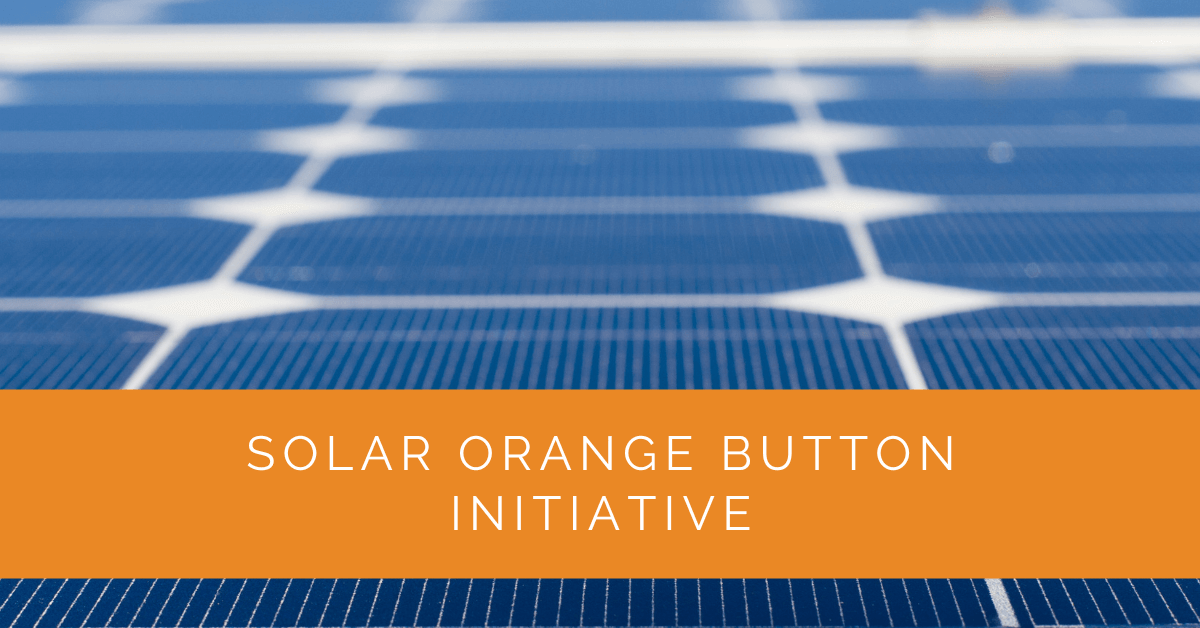The solar industry is experiencing unprecedented growth but faces numerous challenges that hinder its full potential. Among these challenges is the lack of standardized data, which leads to inefficiencies, increased soft costs, and complications in solar project management. The Orange Button Initiative emerges as a groundbreaking solution to this problem, aiming to create a standardized data landscape that can revolutionize the solar industry. This article will delve deeply into the Orange Button Initiative, exploring its origins, goals, and transformative impact on the solar industry, including how you can become a part of this revolutionary change.
Contents
- 1 Key Takeaways
- 2 What is the Orange Button Initiative?
- 3 The Importance of Data Taxonomy in the Solar Industry
- 4 The Registry Systems: AHJ and Product Registry
- 5 Blu Banyan: A Case Study in Orange Button Implementation
- 6 Work Groups: Get Involved in the Orange Button Initiative
- 7 Open Source Contributions: How to Get Involved
- 8 The Impact on the Energy Industry
- 9 Case Study: Transforming Solar Project Management with the Orange Button Initiative
- 10 Expert Insights From Our Solar Panel Installers About the Orange Button Initiative
- 11 Conclusion: The Future of Orange Button and the Solar Industry
Key Takeaways
- The Orange Button Initiative aims to standardize data across the solar industry, reducing inefficiencies and lowering soft costs.
- Registry systems like the AHJ and Product Registry and companies like Blu Banyan are leveraging Orange Button data models to streamline operations.
- Open-source contributions and weekly work groups offer opportunities for stakeholders to get involved and shape the future of solar data management.
What is the Orange Button Initiative?
Origin and Goals
The Orange Button Initiative is a collaborative effort launched as a public-private partnership. It is funded by the U.S. Department of Energy and spearheaded by the SunSpec Alliance. The primary objective of this initiative is to create an open data exchange standard that will streamline the entire lifecycle of a solar project. This includes collecting, securing, managing, and exchanging solar datasets. By achieving this, the initiative aims to eliminate inefficiencies, reduce soft costs, and make solar projects more bankable, accelerating the deployment of solar PV systems nationwide.
Involvement of SunSpec Alliance
The SunSpec Alliance plays a pivotal role in the Orange Button Initiative. They are responsible for establishing an open, easy-to-adopt solar data architecture and standards. This comprehensive framework includes everything from a uniform data taxonomy to data exchange protocols and functional specifications for interoperability. Their involvement ensures that the solar industry can have a standardized data landscape, which is crucial for its growth and efficiency.
The Importance of Data Taxonomy in the Solar Industry
What is Orange Button Taxonomy?
Taxonomy, in the context of the Orange Button Initiative, refers to the systematic classification and organization of various solar data elements. The Orange Button Taxonomy is a standardized language for the solar industry, making it easier to share, interpret, and utilize data for various operational and financial processes.
Benefits of Standardized Data Taxonomy
The benefits of having a standardized data taxonomy are manifold. It speeds up processes like financing and asset management and reduces soft costs that are often a burden on solar project budgets. Furthermore, a standardized taxonomy facilitates rapid and seamless data exchange across the solar value chain, from origination to decommissioning. This is particularly beneficial for distributed solar projects, where data standardization can significantly streamline operations and improve the overall efficiency of the energy systems.

The Registry Systems: AHJ and Product Registry
AHJ Registry: Streamlining Permits
The Authority Having Jurisdiction (AHJ) Registry is a web app and API based on Orange Button standards. It identifies the permitting authority for future solar installations by inputting an address or latitude/longitude coordinates. This registry is a game-changer for the solar industry as it helps to streamline the often complicated and time-consuming permitting process, thereby reducing delays and costs associated with solar project deployment.
Product Registry: Standardizing Solar Products
The Product Registry is another essential component of the Orange Button Initiative. It serves as a comprehensive database that identifies solar and storage product SKUs and provides a set of standardized data elements about these products. Doing so helps maintain consistency and easy accessibility of product information across the solar industry, which is crucial for both consumers and businesses.
Blu Banyan: A Case Study in Orange Button Implementation
How Blu Banyan Utilizes Orange Button Data Models
Blu Banyan is a leading software provider specializing in solutions for the solar industry. They have effectively utilized Orange Button data models and API to streamline customer integrations and improve operational efficiency. Their cloud-based ERP, CRM, and project management system, SolarSuccess, leverage Orange Button data to enhance various aspects of solar project management, from customer acquisition to project completion.
Work Groups: Get Involved in the Orange Button Initiative
Weekly Meetings and Community Resources
The Orange Button Work Group conducts weekly meetings to discuss ongoing developments, challenges, and plans. These meetings offer an excellent platform for stakeholders from various solar industry sectors to come together and contribute their insights. By participating in these work groups, you can have a direct impact on shaping the future of solar data standards, thereby contributing to the overall growth and efficiency of the industry.

Open Source Contributions: How to Get Involved
Orange Button on GitHub
The Orange Button Initiative is developed as an open-source project on GitHub, allowing community contributions to the codebase. This collaborative approach ensures that the data standards continue to evolve to meet the ever-changing needs of the solar industry. It also allows developers and other stakeholders to contribute their expertise to this groundbreaking initiative.
License and Code Contributions
The Orange Button project operates under the Apache 2.0 license to encourage commercial adoption. This open licensing model allows anyone interested in contributing to fork the GitHub project, make edits, and submit a pull request. By doing so, you can participate in this revolutionary change that aims to standardize data across the solar industry.
The Impact on the Energy Industry
Distributed Energy Industry and Orange Button
The Orange Button Initiative has broader implications beyond the solar sector; it impacts the entire distributed energy industry. The standardized data models and taxonomies can be applied to other forms of distributed energy, such as wind and hydro, making the initiative a cornerstone for the future of sustainable energy systems.
OB’s Role in Energy Data Exchange
The Orange Button is pivotal in facilitating data exchange across the energy industry. Its standardized datasets and interoperability features make it easier for various stakeholders to share and access crucial information. This, in turn, reduces inefficiencies and promotes a more streamlined and effective energy landscape.
Case Study: Transforming Solar Project Management with the Orange Button Initiative
Background
At Solar Panels Network USA, we have always aimed to provide cutting-edge solar solutions that enhance efficiency and sustainability. The Orange Button Initiative presented an opportunity to revolutionize our data management practices, reducing inefficiencies and lowering soft costs. This case study highlights our experience integrating the Orange Button standards into our operations and the significant impact it had on our project management.
Project Overview
We decided to implement the Orange Button data models and standards across our solar projects to streamline data exchange and improve operational efficiency. The primary goal was to reduce the time and cost associated with managing solar project data, from customer acquisition to project completion.
Implementation
- Initial Assessment: Our first step was conducting a thorough assessment of our existing data management systems. We identified areas where data inconsistencies and inefficiencies were most prevalent. This assessment provided a clear roadmap for integrating Orange Button standards into our workflows.
- Data Standardization: Using the Orange Button Taxonomy, we standardized our data elements, ensuring uniformity across all project phases. This involved reconfiguring our data architecture to align with the Orange Button standards, facilitating seamless data exchange and interoperability.
- Integration with SolarSuccess: To enhance our project management capabilities, we integrated Orange Button data models with our existing SolarSuccess platform provided by Blu Banyan. This integration allowed us to leverage Orange Button’s structured data framework, improving data accuracy and accessibility.
- Training and Adoption: We conducted comprehensive training sessions for our team to ensure smooth adoption of the new data standards. This included workshops on using the Orange Button API and understanding the standardized data taxonomy. Our team quickly adapted to the new system, recognizing the benefits of improved data management.
Results
- Enhanced Operational Efficiency: Implementing the Orange Button standards resulted in a significant increase in operational efficiency. Data consistency and accuracy improved, reducing the time spent on data validation and corrections. This streamlined our project management processes, enabling us to handle more projects simultaneously.
- Cost Reduction: By standardizing data and improving workflow efficiency, we achieved substantial cost savings. The reduction in soft costs associated with data management directly impacted our bottom line, making our solar projects more financially viable.
- Improved Project Management: The integration with SolarSuccess and the use of Orange Button data models enhanced our project management capabilities. Real-time data access and improved interoperability allowed for better decision-making and project tracking. This led to more timely project completions and higher customer satisfaction.
Summary
Integrating the Orange Button Initiative into our operations at Solar Panels Network USA has profoundly impacted our project management and overall efficiency. Standardizing data and leveraging structured data models streamlined our workflows, reduced costs, and enhanced project management capabilities. By embracing this innovative approach, we have positioned ourselves at the forefront of the solar industry’s evolution, demonstrating our commitment to excellence and sustainability.
Expert Insights From Our Solar Panel Installers About the Orange Button Initiative
The Orange Button Initiative is revolutionizing the solar industry by standardizing data, which simplifies project management and reduces costs. This initiative is a game-changer for both installers and customers.
Senior Solar Engineer
Implementing Orange Button standards in our operations has significantly streamlined our data management processes, making it easier to handle complex solar projects with greater efficiency.
Project Manager
By participating in the Orange Button Work Groups, we are directly contributing to shaping the future of solar data management, ensuring that our industry continues to innovate and improve.
Solar Data Specialist
Conclusion: The Future of Orange Button and the Solar Industry
The Orange Button Initiative is more than just a project; it’s a game-changer for the solar industry. Standardizing data and facilitating open data exchange addresses many challenges that have hindered the growth and deployment of solar PV systems. As the initiative continues to evolve, it promises to revolutionize how we manage and exchange solar data. This will make the industry more efficient, cost-effective, and accessible for all stakeholders, from consumers to businesses to policymakers. By getting involved in the Orange Button Initiative, whether it’s through work groups, open-source contributions, or by implementing its standards in your operations, you can be a part of this exciting journey towards a more sustainable and efficient solar industry.
About the Author
Solar Panels Network USA stands at the forefront of solar energy solutions, driven by a team of seasoned solar engineers and energy consultants. With over decades of experience in delivering high-quality solar installations and maintenance, we are committed to promoting sustainable energy through customer-centric, tailored solutions. Our articles reflect this commitment, crafted collaboratively by experts to provide accurate, up-to-date insights into solar technology, ensuring our readers are well-informed and empowered in their solar energy decisions.

